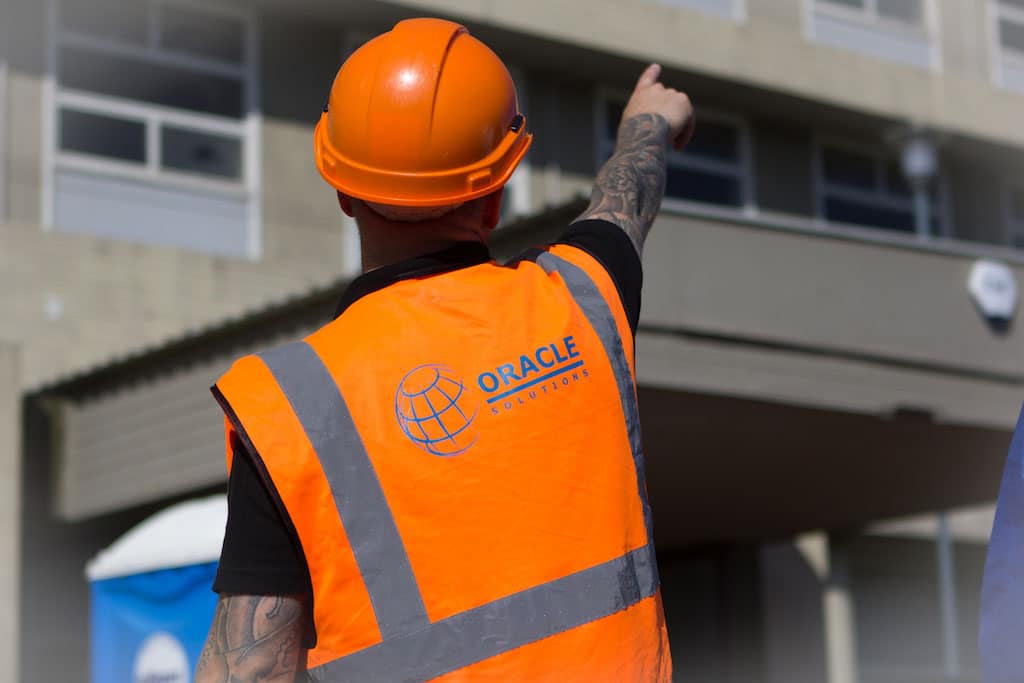The growing demand for asbestos surveyor jobs in the construction industry
The naturally occurring mineral known as asbestos might not have been legal to use in the UK since 1999 – when all forms of the substance were banned – but the role of asbestos surveyor will almost certainly be highly relevant for decades to come.
There are various reasons for this – not least the fact that asbestos continues to be present in great numbers of public, residential, and commercial buildings up and down the UK, more than a generation after the ban. This, in turn, brings a need for building owners to carefully manage the risks that such asbestos could still pose to human health.
Generally, asbestos surveying hasn’t been viewed as a first-choice career option, or as a long-term career for many people working in the construction industry.
However, as asbestos will still realistically be present in significant numbers of UK buildings for many years to come – possibly 100 years or more – there will continue to be an ongoing need for asbestos surveyors over the next few decades.

The persistence of asbestos in the construction industry
The principal job of an asbestos surveyor is to undertake inspections of buildings, and to collect samples of materials suspected to contain asbestos, so that it can be determined whether asbestos is present in the given premises.
One of the most immediate reasons why a building owner may request the services of an asbestos surveyor in the 2020s, is the fact that current UK regulations require it. Specifically, the Control of Asbestos Regulations 2012, also known as CAR 2012, stipulate that those who are responsible for the maintenance and repair of non-domestic premises have a “duty to manage” any asbestos on the site.
However, the sustained importance and relevance of asbestos surveyors isn’t down to regulatory factors alone. After all, one big reason for those regulations being required in the first place, is the fact that asbestos continues to be so widespread in UK buildings.
Even to this day, there is a good chance that if a given building in the UK was constructed prior to the year 2000, it will contain asbestos.
Asbestos was first commercially mined in the middle of the 19th century, and it went on to be heavily used throughout the UK construction industry for the bulk of the 20th century. The fibrous silicate mineral was highly regarded in the construction sector, due to such qualities as its relative availability and affordability, its physical strength, and its fire resistance.
Unsurprisingly, then, during the days before the severe health risks posed by asbestos became widely known, asbestos was used in a huge range of products that found their way into UK buildings. Those products encompassed the likes of:
- Asbestos insulating board
- Asbestos cement products
- Rope seals and gaskets
- Roofing felt
- Textured coatings
- Lagging
In fact, it took all the way until the 1970s for the British public to become highly aware of the increasingly obvious links between asbestos exposure and the development of potentially fatal health conditions, such as mesothelioma or asbestos-related lung cancer. Political pressure consequently grew to ban asbestos in the UK, which – following the banning of amphibole asbestos in 1985 – finally happened for every other type of asbestos in 1999.
Still, even in the 2020s, there is no automatic requirement in UK law for any and every asbestos-containing material (ACM) to be removed from a building in the event of it being found. The result of this is that many building owners leave asbestos in place, and manage and monitor it over time, rather than arranging for its removal.
Asbestos, then, will almost certainly continue to be present in UK buildings for generations to come. It will therefore be an ever-present hazard, especially for those who may carry out construction, demolition, and/or refurbishment work on sites where asbestos is present and could therefore be disturbed.
All of this means that the identification, removal, and ongoing management of asbestos will be critical in ensuring the safety of the public. Asbestos surveyors will play a hugely important role in making this possible.
The increasing demand for asbestos surveyors
Some observers might wonder why demand for asbestos surveyors would necessarily increase over time, particularly given that more than two decades have passed since it was even legal to use asbestos in the construction of buildings in the UK.
However, it is important to bear in mind that as asbestos is gradually removed from the buildings where it presents the most obvious and acute health risk to the public, over time, there is likely to be an ever-greater emphasis on managing asbestos in place in many buildings, instead of removal.
Even if ACMs are in good condition right now, and therefore pose negligible risk of anyone breathing in asbestos fibres from the material, this situation can change over time. A given asbestos-containing product could degrade, thereby heightening the risk of the product releasing asbestos fibres and imperilling human health.
This is without even accounting for the risk of accidental disturbance to ACMs, which will be particularly likely if users of a given building do not even know where asbestos exists on the premises.
These factors, combined, help to explain why the need for skilled asbestos surveyors in the construction sector is likely to grow, instead of decrease, in the years ahead.
The specialised and regulated nature of asbestos surveying
By its very nature, asbestos surveying is a highly specialised and regulated job. Individuals and organisations that have a duty to manage asbestos in their properties in accordance with CAR 2012, require the services of asbestos surveyors who have up-to-date skills and knowledge. And asbestos surveyors, in turn, must ensure they are well-versed in the latest rules, regulations, and good practice for their role.
Asbestos surveying, then, is not something that “just anyone” can do. Capable asbestos surveyors will know the importance of complying with applicable regulations and industry standards, which are liable to change at any time. Consequently, they can expect their services to be sought-after in the construction industry for many decades to come.
Career progression opportunities for asbestos surveyors
Another major factor in the sustained attractiveness and relevance of asbestos surveying, is the considerable scope for qualified surveyors to develop their knowledge and skillset in this field.
Many people who become asbestos surveyors go on to progress to more senior roles, such as supervisor, team leader, or manager positions. Others, meanwhile, decide to become self-employed consultants, or to explore related roles such as general architectural surveying.
Health and safety focus
It might seem an obvious statement to make, that asbestos surveyors place a great emphasis on health and safety in their work. Nonetheless, it is one worth reiterating, especially as the most capable asbestos surveyors constantly work to ensure they implement the most effective safety practices across every assignment they take on.
The role of an asbestos surveyor is a hugely responsible one, which is another reason why the importance of this occupation will not fade anytime soon. Such professionals play an imperative part in protecting workers and the public from asbestos hazards; their ability to do their job well really can make the difference between life and death.
Collaboration and interdisciplinary skills
Something else that asbestos surveyors spend a great amount of time doing, is working closely with others across the construction industry, and beyond.
After all, when it comes to the identification, management, and potential removal of on-site asbestos, there are many stakeholders involved, ranging from the given premises’ dutyholders to construction workers whose work might put them at risk of disturbing asbestos.
Indeed, one of the steps that CAR 2012 requires the dutyholder to take, is to provide information on the location and condition of ACMs to anyone – such as a construction worker – who is liable to work on or disturb such materials.
Given the profoundly important work that asbestos surveyors do to discover such information in the first place, it is crucial that they are able to collaborate well with other professionals in the construction industry. By doing so, they will be able to provide the benefit of their skills and knowledge in asbestos surveying to other people, including when it comes to keeping people safe.
Professional training and certification
As we have written in our guide on how to become an asbestos surveyor, there are various potential routes to becoming an asbestos surveyor in the UK. Whichever path one takes, however, they can expect to require specialised training and certification.
A surveyor holding an industry-recognised asbestos surveying qualification, such as the P402 qualification that is offered by the British Occupational Hygiene Society (BOHS) and other companies, or the RSPH Level 3 Award in Asbestos Surveying, will be vital for reassuring a dutyholder that they have hired a suitably skilled and knowledgeable asbestos professional.
To reaffirm what we have tried to get across throughout this article, asbestos surveying is extremely specialised, sensitive, and important work, that “not just anyone” can do. So, the right mix of knowledge, skills, training, and certification will go a long way to ensuring such a professional is genuinely effective in that work.
Industry recognition and opportunities
We have, mercifully, come a long way since the days when fresh asbestos risks were frequently and easily generated every time new construction, refurbishment, and/or demolition work was carried out on a property containing asbestos.
That situation has partly changed because of the stringent regulations that have come into force after the banning of asbestos in the UK in 1999. However, asbestos surveyors themselves have also played a critical role in ensuring safe construction practices, through their careful and diligent work to identify possible ACMs, alongside assessment of the risks such materials can pose.
As we move away from an era in which many people have living memory of a time when asbestos was widely used in UK construction, it will become even more important to guard against complacency in the management of asbestos.
Skilled asbestos surveyors, then, will be well-placed to tap into plentiful and growing opportunities for their services over the decades to come.
Asbestos surveyors’ expertise will be needed for a long time yet
With around 5,000 deaths continuing to occur in the UK every year as a consequence of asbestos-related disease, it should be clear enough that asbestos is sadly not a mere “historical” issue, despite more than a generation having passed since the 1999 ban.
What might not be so obvious to some observers, however, is that asbestos still has an extremely widespread presence across the UK’s stock of public, commercial, and residential buildings. This means that new instances of asbestos exposure can – and do – still occur, with the attendant long-term health risks for those who ingest or breathe in the substance.
Asbestos surveying, then, is not an occupation that will recede in importance at any point soon. It is a highly specialised role with considerable scope for career progression, to a much greater extent than many people might realise.
If, then, you are reading this as someone who is seeking out a valuable and rewarding long-term career, our team at Oracle Solutions would suggest that you seriously consider asbestos surveying. In much the same way as asbestos is not restricted to being a 19th-century or 20th-century problem, asbestos surveying is a job of immense relevance in the 21st century, and this will remain the case throughout the next few decades.
Are you on the lookout for asbestos services that you can trust, such as asbestos surveying, training, and/or removal, to cite just some of our areas of knowhow? If so, please don’t wait any longer to contact the Oracle Solutions team for a quote.

Written by Brendan Coleman
Brendan Coleman, with decades of experience in the asbestos industry, is a dedicated Quality Manager. Certified as a surveyor and analyst, he is adept in operations and quality management with a keen focus on HSE compliance. His expertise is pivotal in maintaining high safety and efficiency standards. Brendan ensures our UKAS accreditation requirements are consistently met and exceeded, upholding stringent standards in asbestos remediation. His commitment to enhancing quality and customer satisfaction makes him an essential advisor in asbestos management.
